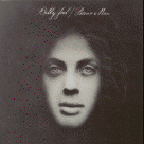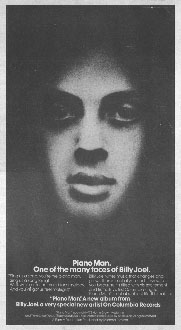![]()
  |

Piano Man
Billy Joel
Columbia 32544
Released: November 1973
Chart Peak: #27
Weeks Charted: 40
Certified Double Platinum: 11/21/86
 Billy Joel's music has suffered in comparison to better established acts. His group the Hassles were a Vanilla Fudge/Rascals spinoff, his work with Attila was bettered by Lee Michaels, and his only semi-hit was a bit of pop schlock. Recent gigs at the piano bar on the seamy side of L.A. have given him a new perspective and his Piano Man reflects a new seriousness and musical flexibility. Its production is reminiscent of Elton John's, and his music has the show-tune ambience of David Ackles. But his ten new tunes also introduce a more mature, less frantic musician.
Billy Joel's music has suffered in comparison to better established acts. His group the Hassles were a Vanilla Fudge/Rascals spinoff, his work with Attila was bettered by Lee Michaels, and his only semi-hit was a bit of pop schlock. Recent gigs at the piano bar on the seamy side of L.A. have given him a new perspective and his Piano Man reflects a new seriousness and musical flexibility. Its production is reminiscent of Elton John's, and his music has the show-tune ambience of David Ackles. But his ten new tunes also introduce a more mature, less frantic musician.
 Click image for larger view. |
Despite Joel's facility at portraying others, he seems unable to come to terms with himself. The title tune tries to reflect the piano man through his patrons, but Joel fails to illuminate his own character. At other times, like in "The Ballad of Billy the Kid," the singer's bristling ego mocks his supposedly objective point of view.
The production by Michael Stewart and the arrangements by Michael Omartian are full-bodied and thoughtful, employing fine studio help to show Joel's keyboard technique to best advantage. Stewart sometimes builds his walls of sound too quickly, making anticlimactic what might have been powerfully dramatic, but Billy Joel's enthusiasm and musical straightforwardness keep everything together and moving briskly.
- Jack Breschard, Rolling Stone, 3-14-74.
Bonus Reviews!Composer-performer Billy Joel's new album has several striking tracks, among them the title number, a really brilliant piece of work. Piano Man is a highly dramatic song, beautifully constructed and performed, about the patrons of an O'Neill-type bar, each sunk in dreams of glory about his future: the piano man himself, who hopes to be a movie star; the insurance man convinced that he is a novelist; and many others caught in a web of self-delusion. It's very strong stuff, and sung by Joel in a strong, attractive voice that has just the right bittersweet edge. Nothing else here comes up to that song or performance, but there are moments in "Captain Jack" and "Ain't No Crime" that pulsate with the same intensity.
At the moment Joel has two problems: the similarity of approach in performance and orchestration from track to track, and an occasional inability to pare down the central thought of his lyrics. However, this is an album that certainly deserves attention, if only for the superb "Piano Man" track.
- Peter Reilly, Stereo Review, 6/74.
Pianist/singer/writer's first Columbia LP is much more finely-honed than his set on another label, with admirable contributions by arranger Michael Omartian and producer Michael Stewart. Joel has fine shot at establishing himself as consistent quality AM artist with large scale songs and dynamic performing range. Watch the title cut, "Captain Jack" and "Billy The Kid."
- Billboard, 1974.
Joel presents a personal perspective of middle-class teen life in the suburbs ("Captain Jack," "The Ballad of Billy the Kid") followed by life in a cocktail lounge ("Piano Man"), and concludes, "Worse comes to worst, I'll get along." But his already apparent sense of melody and supple singing voice indicate much more promise than that. * * *
- William Ruhlmann, The All-Music Guide to Rock, 1995.
You can almost smell the spilled beer and cigarette smoke on the Piano Man's first album of consequence, which launched and forever defined his career (who can't sing along with the title track bar anthem?). It's vintage Billy at his best -- the stirring music and lyrics haven't aged one bit -- and if some of the ballads are getting jukebox play today by kids not born when this came out, it's little wonder, as how could they not be seduced by the stories he tells? * * * * *
- Zagat Survey Music Guide - 1,000 Top Albums of All Time, 2003.
![]() Reader's Comments
Reader's Comments
No comments so far, be the first to comment.
